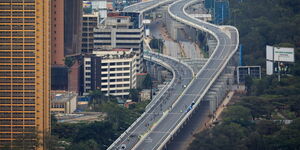The National Environment Management Authority (NEMA) has mandated the use of 100 per cent biodegradable bin bags for organic waste collection starting July 8, 2024.
This directive aims to combat plastic pollution in the country by replacing plastic bags with more eco-friendly alternatives. However, our analysis reveals that this transition may come at a significant cost for Kenyan households upwards of Ksh3,000 on the bio-degradable bags.
The directive encompasses various types of waste, including kitchen scraps, garden waste, and household waste. To comply, households will need to switch to biodegradable bin liners, as recommended by NEMA.
NEMA offices in Nairobi, Kenya.
Photo
Wkimedia Commons
Following the government's ban on plastic shopping bags in 2017, retailers swiftly adapted by implementing charges for carrier bags, creating a new revenue stream for supermarkets and food sellers. This move marked a significant shift in consumer behaviour and highlighted the potential profitability of environmentally friendly alternatives.
Similarly, apartments in Nairobi and other towns began charging tenants a monthly fee for garbage collection services starting from as low as Ksh100 per month.
However, with the transition to biodegradable bags, landlords are expected to raise the garbage collection fee to offset the higher cost of these eco-friendly alternatives. This adjustment could further strain the finances of already burdened families, especially those with limited disposable income.
NEMA's directive requires waste to be collected separately and transported to designated material recovery facilities for further processing, underscoring the importance of proper waste management practices in mitigating environmental damage.
Prices
The price of the soon-to-be outlawed plastic bags varied depending on factors such as size, quality, and place of purchase.
Our analysis of online retailers revealed a wide price range, with plastic bags retailing anywhere from Ksh700 to Ksh1,500 for 50 pieces.
Some supermarket stalls offered plastic bags for prices ranging from Ksh400 to Ksh2,000.
However, the shift to biodegradable bags is expected to come at a higher cost. Our analysis of available biodegradable bags in the market suggests that Kenyans may need to spend upwards of Ksh3,000 to purchase a supply of these eco-friendly alternatives.
In our search for more affordable options, we found that Kenyans could purchase 15 biodegradable bags for Ksh629.
For those in need of larger quantities, such as 100 pieces of the 4-litre bags for kitchen countertop bins, the cost could be as high as Ksh6,239.
Importing biodegradable bags may offer slightly lower prices, but additional shipping and delivery costs need to be factored in.
For example, compostable trash bags suitable for 4-8 litre small trash could cost around Ksh1,700 for 150 bags, while a heavier-duty import of 30 bags could cost approximately Ksh3,000, excluding shipping and delivery fees.
Despite the high prices attributed to limited supply and high demand, it is anticipated that prices will stabilize as the market adjusts to meet the growing demand for biodegradable bags.
History of plastic bag bans
The history of plastic bag bans in Kenya is marked by a series of attempts to address the pervasive issue of plastic pollution. However, these efforts have often faced significant challenges and met with limited success.
In 2007, an attempt was made to clean up the country by banning the manufacture and import of bags up to 0.03 millimetres (30 microns) in thickness. Unfortunately, this initiative failed to achieve its intended impact, as plastic bags continued to be widely used and distributed.
Four years later, in 2011, NEMA declared a ban on plastic bags below 0.6 millimetres in thickness. Despite this regulatory action, little progress was made in reducing the proliferation of plastic bags, highlighting the limitations of enforcement and compliance.
The failure of these early bans can be attributed in part to opposition from industry lobbyists, who argued that implementing such measures would result in significant job losses.
Additionally, the sheer scale of plastic bag usage in urban centres like Nairobi, where millions of bags were issued daily by supermarkets and grocery shops, posed a formidable challenge to enforcement efforts.
In 2014, the Nairobi City County proposed the Plastic Carry Bags Control Bill, which aimed to ban polyethene bags, non-biodegradable plastic bags, and containers made from virgin plastic above a certain thickness and size. Despite the pressing need to address plastic pollution, the bill never materialised into law, underscoring the complexities of policymaking and stakeholder engagement in addressing environmental issues.
The culmination of these past efforts came in 2017 when the Cabinet Secretary of Environment and Natural Resources issued gazette notice number 2356, banning the use, manufacture, and importation of all plastic bags used for commercial and household packaging.
This comprehensive ban represented a significant step forward in Kenya's efforts to combat plastic pollution, reflecting a growing recognition of the urgent need for decisive action.
Plastic garbage bags in Kenya
Photo












